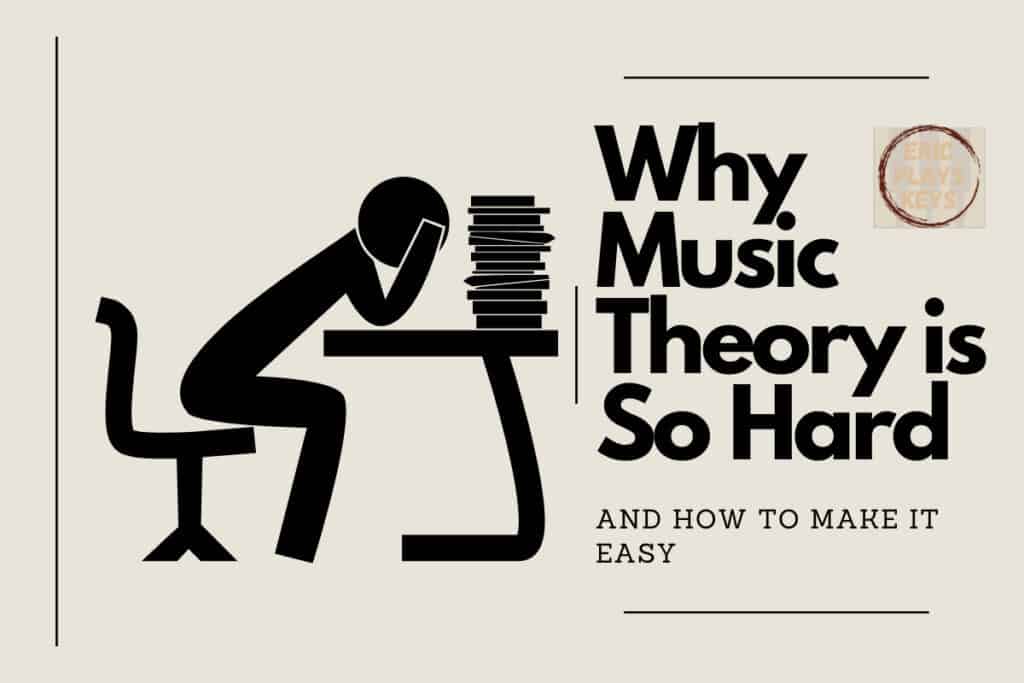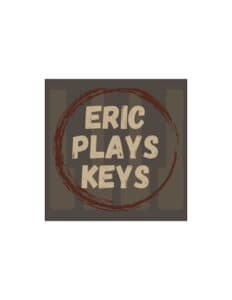
While it’s rare for musicians to claim that learning to play an instrument is easy, it’s extremely rare to hear that learning music theory is easy. There’s one key difference between music performance and music theory that causes this negative reputation for the subject.
Music theory is difficult to learn for many students due to a justifiable lack of motivation. It’s not always clear how learning music theory improves students’ playing, which can cause frustration and annoyance. Focusing on the more practical topics within music theory can alleviate this issue.
In this article, I’ll take a deep dive into why learning music theory can be draining, strategies you can use to stay motivated, and how to be more practical and focused with your music theory studies.
Questioning Why Music Theory is Important is Common
For most music theory students, it doesn’t take long to think of a topic that doesn’t directly apply to their performance-based goals. Whether that be the function of secondary dominants, the names of the tempos, the structure and form of classical era sonatas, or the names of chord inversions – you may wonder why these topics are necessary for soloing over a 12 bar blues in F.
Teachers may even claim these items are necessary to know, and if you are in a music theory class or program, there could be tests on these topics. However, when you actually play your instrument, there is never an instance where any of this knowledge comes into play. You may even find that you can perform and learn your music just fine already! This is a shared experience by many students.
I’m not saying music theory isn’t valuable – if you’re interested in learning these topics, more power to you! However, if certain topics are not resonating with you, and you’re forced to learn them, AND you don’t see how they relate to your playing, this can cause some negative emotion.
That’s why music theory is hard to learn for so many – they simply just don’t care about the topics that aren’t relevant to them. And when you try to learn anyways, you’ll face heavy resistance, boredom, fatigue, and distaste towards your studies.
My own experience is somewhat similar to the majority of students – I was forced to learn music theory in order to pass exams, and I grew to dislike it. Years later, as I started expanding into other genres and gigging, I realized that certain topics I learned were extremely valuable to my playing. Other topics I’ve long forgotten about, and will likely never use every again. However, at the time, nothing seemed to apply, and it was difficult for me to focus.
How to Make Learning Music Theory Easy
By choosing only topics that are relevant to the material you are learning, learning music theory can be made easier. When the practical applications of music theory are evident, students can stay motivated to learn even technically challenging information.
Different topics may be relevant to different students, and at different points in time. For example, the structure of a sonata may be very relevant to a classical student, especially if they are learning one and have a performance coming up. This might not apply to a guitar student learning to play rock music in a band, but knowing some chord inversions to ensure the melody note is on top might come in handy.
The rule of thumb I prefer is to learn music theory on a ‘need to know’ basis. This means that as music theory topics present themselves to you as necessary, you learn them. When adopting this style of learning, the tangible benefits of learning the music theory topic are dangling right in front of you as you learn. If it relates to something you want to accomplish in your playing, you’ll find a way to learn it to the best of your ability.
Of course, this is my own suggestion, and there may be other opinions about the best way to go about learning music theory. However, this is the strategy I personally use, and it helps me stay motivated and inspired to learn topics that I otherwise may not feel like spending my time on.
There are some topics that are more practical than others. Almost all musicians (and especially piano players) will want to learn the names of the basic chords, chord tones, and scales. This is because most songs you’ll play are built on the foundation of chords and chord progressions. Next, learning basic rhythms and time signatures will help you stay on beat and help your groove and feel. Finally, knowing basic song structure terminology (chorus, verse, bridge, breakdown, etc.) will help you memorize songs, communicate with other musicians, and understand how your songs should develop from start to end.
These commonly used music theory elements will help immensely as you learn music because you’ll know things about songs before you even learn them. For example, if you know you’re playing a rock song in the key of F, you can be very sure you’ll encounter a 4/4 rock beat, a couple verses/choruses, a bridge, and potentially some Bb major, C major, and D minor chords. Every song is different, but there are common threads that you’ll learn to anticipate after learning some music theory.
Finally, if you are playing in a band, basic music theory terminology will likely be used to communicate what to play between band members. The leader of the band may say something like ‘the verse is an F blues, go to the 5 for the chorus, and the bridge has hits on beat 2 and 4’. If you understand the chords in the F blues, what chord corresponds to the 5 in F, what a chorus and bridge are, what ‘hits’ are, and what beats 2 and 4 are, you’ll basically know the whole song already.
For a deeper dive into the practical applications of music theory concepts, and examples, check out this article.
Music Theory Still Will Be Difficult, But Doable
I’m definitely not saying that learning music theory will be easy, even if you stick to the most practical topics. This is because it can be a highly technical subject, and it may take time to internalize the large amounts of information necessary.
First, there’s 12 keys in western music, so every chord and scale you learn will have to be learned in 12 times. Each key has its own set of chords, scales, and chord tones. For example, you’ll have to learn the 5 chord 12 times. There’s several different chord qualities as well, including major, minor, and dominant, which will all have to be learned for all 12 keys.
There’s no shortcuts to learning music theory topics, especially because you’ll have to know them like the back of your hand to get the most practical application from them. For example, when you’re playing a song, there’s no time to figure out what the 2, 4, and 5 chords are by counting up from the root – you just have to know them immediately in order to play them at the right time.
However, if you’ve mastered your basic concepts, the rewards are immense. You’ll be able to collaborate with other musicians efficiently, understand the music you’re playing quickly, and maybe even write your own music with ease! Music theory can be very rewarding in this way, just like learning an instrument. It will be difficult, but it’s absolutely meaningful. You can use this skill to turn your piano skills into an enriching hobby.
How to Identify What Topics to Learn and Skip
This goes back to the ‘need to know’ basis. If your head is swimming with the examples I talked about in this article, don’t worry! If you haven’t heard of any of the terms or concepts in the examples yet, don’t bother learning them right now. Continue to play your instrument in whatever capacity, genre, or situation that you want to. If certain terminology or concepts come up organically during your journey, that’s your cue to do a couple google searches and start getting yourself up to speed.
Another note – if you feel bored while learning a music theory concept, I’d recommend just skipping it. Try not to develop a negative relationship with any aspect of your musical journey, because it can hinder your progress in the long run. The whole point of playing an instrument is to have fun, after all (in my opinion).
You may even realize that skipping music theory does have some negative effects on your playing. If you’re OK with that, then there’s no need to learn music theory. It’s much more important that you love your practice habits and stick with them. At some point in time, you may change your mind, but for now, just focus on what you enjoy and craft your journey to your liking.
It’s much easier to craft your own learning curriculum if you’re self-taught – check out my article on teaching yourself to play to learn more.
Some Musicians Hate Music Theory, Some Advocate For It
As you meet other musicians, you’ll probably encounter a lot of various opinions on music theory. Some players may tell you that any time you spend on music theory is waste. Others may tell you you’re not a real musician if you haven’t learned basic music theory concepts. Be aware that every musician is on their own journey, and every journey is supposed to be unique. What works best for you is not necessarily the same as your peers and teachers, so be wary of the advice you get.
